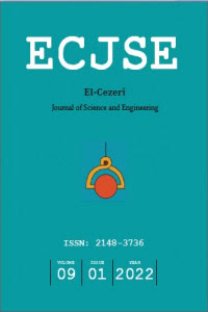Konutlarda PV ve Enerji Depolama Sistemiyle Talep Yönetiminin Ekonomik Analizi
PV Modül, Enerji Depolama Sistemleri, Talep Yönetimi, Dağıtım Şebekeleri
Economic Analysis of Demand Side Management with Residential PV System and Energy Storage System
PV Modules, Energy Storage Systems,
___
- [1] Ravishankar, A. N., Ashok, S. , Kumaravel, S., Effects of demand side management & storage on renewable energy penetration to the grid, Proceedings of the 2017 Third International Conference on Advances in Electrical, Electronics, Information, Communication and Bio-Informatics (AEEICB), Chennai, 2017, pp. 329-335.
- [2] Federica, C., Idiano, D., Massimo, G., Photovoltaic energy systems with battery storage for residential areas: an economic analysis, Journal of Cleaner Production, vol. 131, pp. 460-474, 2016.
- [3] Numbi, B. P., Malinga, S. J., Optimal energy cost and economic analysis of a residential grid-interactive solar PV system- case of eThekwini municipality in South Africa, Applied Energy, vol. 186, pp. 28-45, 2017.
- [4] Fernando, M. C., Rui, C., Almeida, M. E., Pires, V. F., Economic assessment of residential PV systems with self-consumption and storage in Portugal, Solar Energy, vol. 150, pp. 353-362, 2017.
- [5] Manuel, R., Marian, H., Valentin, B., Wolf, F., Impact of residential electricity tariffs with variable energy prices on low voltage grids with photovoltaic generation, International Journal of Electrical Power & Energy Systems, vol. 79, pp. 161-171, 2016.
- [6] Arráez-Cancelliere, O. A., Muñoz-Galeano, N., Lopez-Lezama, J. M., Performance and economical comparison between micro-inverter and string inverter in a 5.1 kWp residential PV-system in Colombia, Proceedings of the 2017 IEEE Workshop on Power Electronics and Power Quality Applications (PEPQA), Bogota, Colombia 2017, pp. 1-5.
- [7] Lam, R. K., Tran, D. H., Yeh, H. G., Economics of residential energy arbitrage in california using a PV system with directly connected energy storage, Proceedings of the 2015 IEEE Green Energy and Systems Conference (IGESC), Long Beach, CA, 2015, pp. 67-79.
- [8] Villalva, M. G., Gazoli, J. R., Ruppert, F. E., Modeling and circuit-based simulation of photovoltaic arrays, Proceedings of the 2009 Brazilian Power Electron. Conf., Bonito, BRAZIL, 2009, pp. 1244–1254.
- [9] Tian, H., Mancilla-David, F., Ellis, K., Eduard, M., Peter, J., A cell-to-module-to-array detailed model for photovoltaic panels, Solar Energy, vol. 86, pp. 2695-2706, 2012.
- [10] El-Saadawi, M. M., Hassan, A. E., Abo-al-ez, K. M., Kandil, M. S., A Proposed Dynamic Model Of Photovoltaic-DG System, in Proceedings of the 2010 1st Int. Nucl. Renew. Energy Conf., Amman, Jordan, 2010, pp. 1-6.
- [11] Abdulkadir, M., Samosir, A. S., Yatim, A. H. M., Modeling and simulation based approach of photovoltaic system in Simulink model, ARPN J Eng Appl Sci., vol. 7, pp. 616–623, 2012.
- [12] Yao, E., Samadi, P., Wong, V. W. S., Schober, R., Residential Demand Side Management Under High Penetration of Rooftop Photovoltaic Units, IEEE Transactions on Smart Grid, vol. 7, pp. 1597-1608, 2016.
- [13] Strbac, G., Demand side management: Benefits and challenges, Energy Policy, vol. 36, pp. 4419–4426. 2008.
- [14] Conejo, A. J., Morales, J. M., Baringo, L., Real-time demand response model, IEEE Trans. Smart Grid, vol. 1, pp. 236–242. 2010.
- [15] Samadi, P., Mohsenian-Rad, H., Wong, V. W. S., Schober, R., Real-time pricing for demand response based on stochastic approximation, IEEE Trans. Smart Grid, vol. 5, pp. 789–798, 2014.
- [16] Pedrasa, M. A. A., Spooner, T. D., MacGill, I. F., Coordinated scheduling of residential distributed energy resources to optimize smart home energy services, IEEE Trans. Smart Grid, vol. 1, pp. 134–143, 2010.
- [17] Atzeni, I., Ordonez, L. G., Scutari, G., Palomar, D. P., Fonollosa, J. R., Demand-side management via distributed energy generation and storage optimization, IEEE Trans. Smart Grid, vol. 4, pp. 866–876, 2013.
- [18] Adika, C. O., Wang, L., Autonomous appliance scheduling for household energy management, IEEE Trans. Smart Grid, vol. 5, pp. 673–682, 2014.
- [19] Awad, A. S. A., Fuller, J. D., EL-Fouly T. H. M., Salama, M. M. A., Impact of Energy Storage Systems on Electricity Market Equilibrium, IEEE Transactions on Sustainable Energy, vol. 5, pp. 875-885, 2014.
- [20] Choi, M. E., Kim, S. W., Seo, S. W., Energy Management Optimization in a Battery/Supercapacitor Hybrid Energy Storage System, IEEE Transactions on Smart Grid, vol. 3, pp. 463-472, 2012.
- [21] Barton, J. P., Infield, D. G., Energy storage and its use with intermittent renewable energy, IEEE Transactions on Energy Conversion, vol. 19, pp. 441-448, 2004.
- [22] Wook, K., Van-Huan, D., Thanh-Tuan, N., Woojin, C., Analysis of the effects of inverter ripple current on a photovoltaic power system by using an AC impedance model of the solar cell, Renewable Energy, vol. 59, pp. 150-157, 2103.
- [23] http://www.kyocera.com.sg/products/solar/pdf/kc200gt.pdf Accessed 23 May 2017
- [24] http://www.epdk.org.tr/TR/Dokuman/7292 Accessed 23 June 2017[25] Ranjan, R., Das, D., Simple and Efficient Computer Algorithm to Solve Radial Distribution Networks, Electr Power Components Syst., vol. 31, pp. 95–107, 2003.
- ISSN: 2148-3736
- Yayın Aralığı: Yılda 3 Sayı
- Başlangıç: 2013
- Yayıncı: Tüm Bilim İnsanları ve Akademisyenler Derneği
Siltli Kumlarda Gerilme Kontrollü ve Deformasyon Kontrollü Sıvılaşma Testlerinin Karşılaştırılması
250W Elektrikli Bisikletin Kablosuz Güç Aktarımı ile Sabit Akım/Gerilim Modunda Şarjı
Murat BAYRAKTAR, Emin YILDIRIZ
Bir Izgara Ağı Topolojisi Üzerinde CoAP’ın Veriye Dayalı Modellemesi ve Verimliliğinin Tahmini
Tuz ve Biber Gürültü Kaldırma için Uyarlamalı Cesáro Ortalama Filtresi
Serdar ENGİNOĞLU, Uğur ERKAN, Samet MEMİŞ
Gerilim Kararlılığının Farklı İşletme Şartlarında İncelenmesi
GFRP Çubukların Özelikleri ve Prefabrik Altyapı Elemanlarında Kullanımı
İlker Bekir TOPÇU, Tayfun UYGUNOĞLU
Konutlarda PV ve Enerji Depolama Sistemiyle Talep Yönetiminin Ekonomik Analizi
